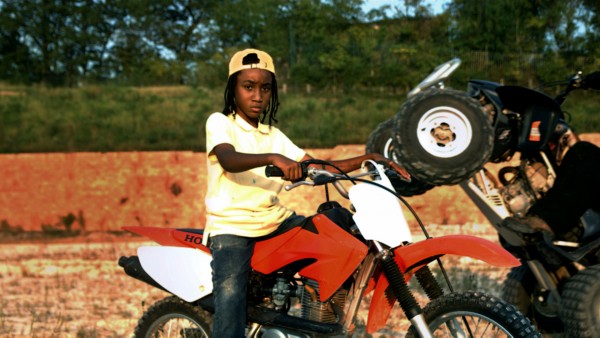12 O’CLOCK BOYS (Lotfy Nathan, 2013)
AMC Empire 25, 234 West 42nd St. between Seventh & Eighth Aves., 212-398-2597
Angelika Film Center, 18 West Houston St. at Mercer St., 212-995-2570
Opens Friday, January 31
www.12oclockboys.com
 For twenty years, Baltimore has been defined by such television series as Homicide: Life on the Street, The Corner, and The Wire, shows filled with rampant violence and drugs. This past November, the U.S. Census Bureau released data showing that the poverty rate from 2010 to 2012 in the city of Baltimore was more than twenty-five percent. During that same period, debut filmmaker Lofty Nathan embedded himself with a group of teens and young twentysomethings who ride two- and four-wheel dirt bikes through the streets and parks of Charm City, popping vertical wheelies that point up at the sky. Nathan documents their activities in 12 O’Clock Boys, offering an inside look at this dangerous phenomenon (which has spread to other inner cities as well). “This is our tradition, our culture, this is what we do. Can’t nobody take it from us. This is our release,” one rider says as he puts on a mask. “Baltimore City Sunday: F@ck city council, f@ck the police. I pity them that try to stop us. This is our sh*t.” Indeed, the police are rarely far away, either in marked cars or helicopters, but they are limited in how they can chase the riders because of public safety concerns. Nathan focuses in on twelve-year-old Pug, a tough-talking, smart street kid who starts skipping school, instead dedicating his every waking moment to trying to become a Twelve O’Clock Boy. Meanwhile, there’s little his mother, Coco, a former exotic dancer raising five children on her own, seems to be able to do to stop him. It’s sad to see Pug make this choice, turning his back on education while declaring the police to be the enemy, but Nathan makes no moral judgments about him or any of the other boys and men who take part in this illegal activity, which seems to exist primarily to fight authority. He also doesn’t delve into the political, socioeconomic, and racial factors that have impacted the rise of such a scenario. Instead, he lets Pug, Superman, Shawn Sean, Wheelie Wayne, and Albert Lemon — a former copy now running a regional security outfit — speak for themselves. And it’s a scary story, one that, regardless of which side you’re on, can only have a tragic outcome if something isn’t done about it.
For twenty years, Baltimore has been defined by such television series as Homicide: Life on the Street, The Corner, and The Wire, shows filled with rampant violence and drugs. This past November, the U.S. Census Bureau released data showing that the poverty rate from 2010 to 2012 in the city of Baltimore was more than twenty-five percent. During that same period, debut filmmaker Lofty Nathan embedded himself with a group of teens and young twentysomethings who ride two- and four-wheel dirt bikes through the streets and parks of Charm City, popping vertical wheelies that point up at the sky. Nathan documents their activities in 12 O’Clock Boys, offering an inside look at this dangerous phenomenon (which has spread to other inner cities as well). “This is our tradition, our culture, this is what we do. Can’t nobody take it from us. This is our release,” one rider says as he puts on a mask. “Baltimore City Sunday: F@ck city council, f@ck the police. I pity them that try to stop us. This is our sh*t.” Indeed, the police are rarely far away, either in marked cars or helicopters, but they are limited in how they can chase the riders because of public safety concerns. Nathan focuses in on twelve-year-old Pug, a tough-talking, smart street kid who starts skipping school, instead dedicating his every waking moment to trying to become a Twelve O’Clock Boy. Meanwhile, there’s little his mother, Coco, a former exotic dancer raising five children on her own, seems to be able to do to stop him. It’s sad to see Pug make this choice, turning his back on education while declaring the police to be the enemy, but Nathan makes no moral judgments about him or any of the other boys and men who take part in this illegal activity, which seems to exist primarily to fight authority. He also doesn’t delve into the political, socioeconomic, and racial factors that have impacted the rise of such a scenario. Instead, he lets Pug, Superman, Shawn Sean, Wheelie Wayne, and Albert Lemon — a former copy now running a regional security outfit — speak for themselves. And it’s a scary story, one that, regardless of which side you’re on, can only have a tragic outcome if something isn’t done about it.
